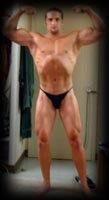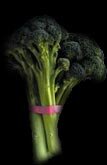 |
||
 |
What Does Catabolic Mean? Catabolic refers to the metabolic process that is characterized by molecular breakdown and energy release, such as the decrease of muscle mass. Thus, it means "muscle loss" in many common bodybuilding contexts. |
 |
 |
||

Tricking The Body
However, there are many little ways to trick the body so that most of the catabolism is confined to fat tissue and muscle tissue is preserved. In this article, I will give tips how to stay out of muscle catabolism (breakdown) and in fat catabolism.
 First off, let's talk about what kind of diet you should be on. There have been many diet fads in the past few years, with ketogenic diets becoming more and more popular among bodybuilders... and for good reason, they work very well for fat loss.
First off, let's talk about what kind of diet you should be on. There have been many diet fads in the past few years, with ketogenic diets becoming more and more popular among bodybuilders... and for good reason, they work very well for fat loss.
However, if you have an extended period of time to lose fat and would like to preserve as much muscle as possible I suggest another alternative. To start off this discussion, let's use, for example, a person who weighs 170 lbs and who's daily calorie maintenance level is 2500.
To lose one pound of fat per week (a rough estimate of optimal fat loss) they should be eating 2000 calories per day (-500 calories below maintenance).

The Hardcore Bodybuilders
Now, if this person is a hard-training bodybuilder (which I assume is most of my audience) they will probably want around 1.3g protein per pound bodyweight since they will be in calorie deficit and in need of more protein to preserve muscle mass.
 That would put their protein count at 220 grams per day (880 kcals from protein). Now we'll move on to fat intake. The basal fat level for any kind of diet should consist of 20% of calories from fat as a minimum to ensure proper hormonal function among other things (skin tone, nails, etc).
That would put their protein count at 220 grams per day (880 kcals from protein). Now we'll move on to fat intake. The basal fat level for any kind of diet should consist of 20% of calories from fat as a minimum to ensure proper hormonal function among other things (skin tone, nails, etc).
That means they'll need about 45g of fat (roughly 400 kcals) from fat. Now here is where I differ from people who advocate keto diets for bodybuilders. Having established the basal level for protein and fat we now have appox. 720 kcals left to work with.
| RELATED ARTICLE | ||
|
People who are advocates of keto diets would suggest that you make most of these 720 kcals come from fats, so that your carbohydrates are kept low enough to allow you to go into ketogenesis. However, I suggest taking these extra calories and adding them towards the carbohydrate count, in this particular person's case this amounts to about 180g of carbs per day.
 To Find Your Favorite Protein Bars, Click Here.
To Find Your Favorite Protein Bars, Click Here.

Why Carbs?
Why carbs instead of fat? Well there are a couple of reasons... the main reason being that carbs are more protein-sparing than fats. Indeed, glycolysis (breakdown of glucose to manufacture ATP) is much more efficient than fat oxidation. Now I'm sure your asking what I mean by protein sparing.
 |
||
 |
What Is Glycolysis? Glycolysis is the metabolic breakdown of sugar, thus releasing energy in the form of ATP (adenosine triphosphate, a neurotransmitter and the major energy source within cells that drive muscle contraction and protein synthesis). |
 |
 |
||
When the body is in calorie deficit it may actually oxidize amino acids from protein you eat to make ATP, it may even oxidize the muscle tissue itself for energy.
Since carbs are more protein sparing than fats it only makes sense that if our goal is muscle preservation during dieting that we should not neglect carbohydrates. Now before I continue lets take another look at this individual...
| Weight | 170 lbs |
| Maintenance daily caloric intake | 2500 kcals |
| Diet calorie intake | 2000 kcals |
| Protein | 220g |
| Carbs | 180g |
| Fat | 45g |

Timing Of Carbohydrate Intake
The times when carbohydrates should be consumed are the times at which the body is under the greatest stress and is in the most danger of muscle catabolism. These times are in the morning after awakening, workouts, and cardio sessions.
 The optimum way work this diet would be to do your lifting session about an hour after breakfast. If you can in fact do this then here is how I would ration your carbohydrate intake: 40% of daily carbs pre-workout, 45% of daily carbs with post workout meal, 10% with 3rd meal and the other 5% should come from vegetables sources the rest of the day such as salads, broccoli, etc. Rationing your carbohydrates this way does several things.
The optimum way work this diet would be to do your lifting session about an hour after breakfast. If you can in fact do this then here is how I would ration your carbohydrate intake: 40% of daily carbs pre-workout, 45% of daily carbs with post workout meal, 10% with 3rd meal and the other 5% should come from vegetables sources the rest of the day such as salads, broccoli, etc. Rationing your carbohydrates this way does several things.
- Repletes your glycogen stores, thus giving you more energy for your workout.
- Causes insulin to be released (from breakfast meal) during training which will blunt the release of other catabolic hormones. The post workout carbs will help replete glycogen stores and jump start your recovery by releasing more insulin.
- The carbs will be very protein sparing, thus helping prevent muscle catabolism while your body is under stress.
During these high carb meals, you should try to keep your fat intake as low as possible as it will interfere with the release of insulin and will add unneeded calories to these meals. The bulk of your fat intake should be spread evenly over your low carbohydrate meals.

Protein
Protein intake should be even throughout the day although there would probably be a slight advantage to consuming a bit more protein post workout and before your retire for the night.
 Now let's discuss the type of carbs you will want to consume. Pre-workout focus on consuming medium to slow digesting carbohydrates such as oatmeal and bran cereal. Try to stay away from fructose at all times. Your post workout meal should actually be 2 meals, 1 meal immediately after your workout (a liquid meal preferably) and another meal 45 minutes later.
Now let's discuss the type of carbs you will want to consume. Pre-workout focus on consuming medium to slow digesting carbohydrates such as oatmeal and bran cereal. Try to stay away from fructose at all times. Your post workout meal should actually be 2 meals, 1 meal immediately after your workout (a liquid meal preferably) and another meal 45 minutes later.
For the individual in question, their first meal post workout a shake containing a blend of proteins (egg, whey, and casein) along with about 20g dextrose and 25g maltodextrin would be an optimal mix. These carbs are absorbed quickly and will cause a quick and large rise in insulin. 45 minutes later, however, this insulin spike will begin to actually crash.
| RELATED ARTICLE | ||
|
This is where they will want to consume another 35g of slow digesting carbs in order to stabilize their insulin levels and give their body slow digesting carbs to continue to aid in the recovery process. Once again, oatmeal, oat bran, bran cereal are all good choices. I would also suggest a small protein source such as a small (3.5 oz) chicken breast.
If you have questions or comments about this article, please email me at biolayne@yahoo.com or find me on the message boards under the screen name str8flexed.


